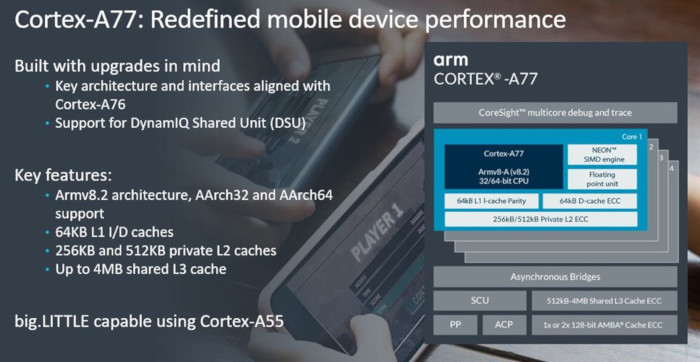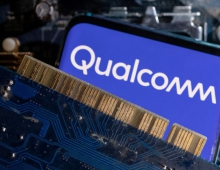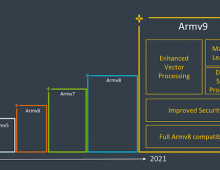
Arm's Latest Cortex-A77 CPU Mobile Processor Boasts High-end Gaming Performance, Enhanced AI
On Monday at Computex 201 Arm debuted the ARM Cortex-A77 CPU core and its its highest-performing premium GPU yet build on a brand-new architecture: the Mali-G77.
These next-generation cores for premium smartphones are expected to power handsets in 2020. The blocks target the same 7nm node and 3GHz maximum frequencies as the current generation but deliver 20-40% performance gains thanks to a host of architecture upgrades.
Arm says that the Cortex-A77 CPU dispatches up to 20% more instructions per clock than the current A76 while staying within its same thermal/power envelope and similar or smaller area. Improvements include 50% increases in both instruction dispatch and integer-execution bandwidth, a 33% larger branch-target buffer, and a 25% increase in the out-of-order window size.

The related Mali-G77 graphics core sports an estimated 40% overall performance boost thanks to its new Valhall architecture. It sports a simplified instruction set, quad texture mapper and a 16-channel data path compared to eight channels on the current G76.
The result is about 30% faster game play or similar boosts in battery life for game play, Arm said. The G77 can be configured with 7-16 shader cores and 2-4 slices of L2 cache, totaling 512KBytes to 4MBytes.
These high-end graphics aid in the GPU's ability to adopt evolving AR technology "that will transform mobile gaming and other mobile user experiences." Furthermore, the improved machine learning capacity greatly enhances the GPU's intelligence, allowing tasks to be performed on-device. This is more efficient and more secure than sending them to the cloud for processing.
Arm has not announced when the GPU will launch, but you can expect it to be integrated into upcoming Nvidia, Qualcomm and Samsung processors.
The related Mali-D77 display processor offloads tasks that otherwise could consume more than 15% of the cycles of the graphics core. Much of the focus of the core is on enabling performance for virtual reality headsets that Arm believes will require in 2020 support for resolutions of 4,320x2,160 pixels at 90 frames/second or 3,600x1,800 pixels at 120 f/s.
The D77 includes new hardware for VR acceleration. The core is optimized for 3K video at 120 and said it is capable of 4K video at 90 f/s.
The new cores are upgrades of blocks Arm rolled out last year, claiming they came within 10% of the performance Intel x86 chips in laptops.





















